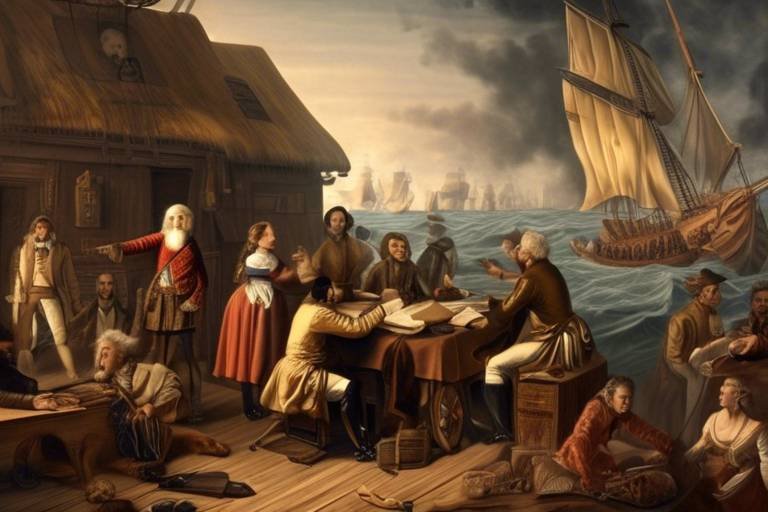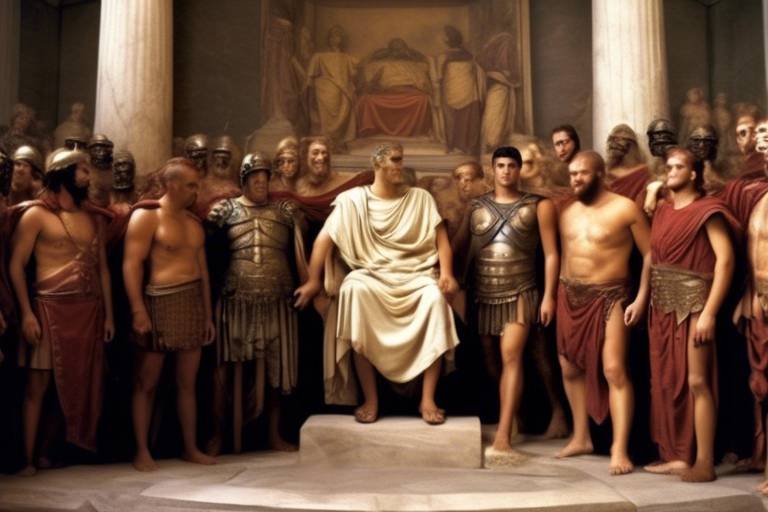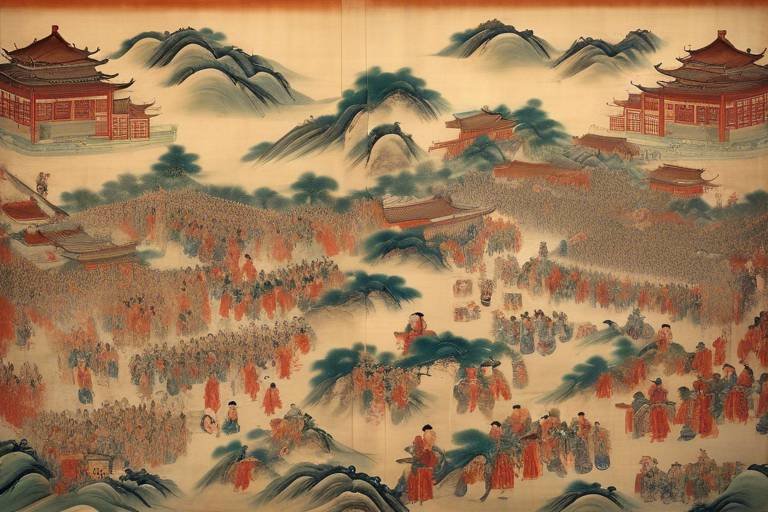The Historical Context of the Age of Discovery
Exploring the era of the Age of Discovery, this article delves into the historical background that led to this period of maritime exploration, expansion, and colonization by European powers, shaping the course of world history.
The Age of Discovery, also known as the Age of Exploration, was a significant period in history that saw European nations venturing into uncharted waters in search of new lands, riches, and opportunities. This era, spanning from the 15th to the 17th century, was driven by a combination of factors that ignited a wave of exploration unlike any seen before.
At the root of this era lay a potent mix of motivations that spurred European powers to set sail into the unknown. Technological advancements, such as the development of more seaworthy ships like the caravel, compasses, and improved navigational tools, played a crucial role in enabling longer and safer voyages across the seas.
Moreover, the thirst for wealth and power drove nations like Spain, Portugal, England, and France to seek new trade routes to the lucrative markets of Asia. The desire to bypass the Ottoman Empire's control over the Silk Road and spice trade motivated explorers to find alternative routes, leading to the discovery of new lands and the establishment of colonies.
The Age of Discovery had a profound impact on indigenous peoples across the globe. The encounters between European explorers and native populations often resulted in cultural clashes, exploitation, and the imposition of colonial rule. The spread of diseases, such as smallpox and measles, brought by the Europeans decimated indigenous communities, leaving a lasting scar on their societies.
Key figures like Christopher Columbus, Vasco da Gama, and Ferdinand Magellan emerged as pioneers of this age, undertaking daring voyages that expanded the known world and reshaped global trade networks. Their discoveries opened up new lands, resources, and opportunities for European powers, forever altering the course of history.
Technological advancements played a crucial role in driving the Age of Discovery forward. Innovations in ship design, navigation tools, and cartography revolutionized maritime exploration, allowing explorers to venture further into unknown waters with greater precision and safety.
The competition and rivalries between European powers during this era were fierce and relentless. Nations vied for control of lucrative trade routes, resources, and territories, leading to conflicts, alliances, and the establishment of vast colonial empires that spanned continents.
The cultural exchange and globalization that resulted from the Age of Discovery reshaped societies on a global scale. The encounter between different civilizations led to the exchange of ideas, goods, technologies, and languages, laying the foundation for the interconnected world we live in today.
Reflecting on the enduring legacies of the Age of Discovery, it is clear that this period had far-reaching consequences that continue to influence geopolitics, economics, and culture. The echoes of colonialism, the impact of new trade routes, and the blending of diverse cultures are all part of the lasting legacy of this transformative era in human history.

Roots of Exploration
Exploring the era of the Age of Discovery, this article delves into the historical background that led to this period of maritime exploration, expansion, and colonization by European powers, shaping the course of world history.
During the Age of Discovery, various factors converged to spark a wave of exploration that would change the course of history. Technological advancements played a crucial role, with innovations in ship design and navigation tools enabling longer and safer voyages across the seas. The quest for economic gain was another driving force, as European nations sought new trade routes to Asia in search of valuable goods such as spices, silk, and gold.
Moreover, the desire to spread Christianity and expand political influence also fueled exploration efforts. The competition among European powers for dominance and the thirst for power and prestige further motivated explorers to set sail into the unknown. These early motivations laid the groundwork for the Age of Discovery, setting the stage for a period of unprecedented maritime exploration and expansion.

European Expansionism
Exploring the era of the Age of Discovery, this article delves into the historical background that led to this period of maritime exploration, expansion, and colonization by European powers, shaping the course of world history.
Discussing the early motivations and factors that laid the groundwork for the Age of Discovery, including technological advancements, economic incentives, and the desire for new trade routes to Asia.
European Expansionism during the Age of Discovery was fueled by a fervent pursuit of wealth and power. European nations, hungry for dominance, embarked on daring voyages to expand their empires, establish colonies, and assert control over newfound territories. The thirst for resources and strategic advantages drove these nations to the far reaches of the world, reshaping global dynamics in the process.
Exploring the consequences of the Age of Discovery on indigenous populations around the world, including cultural clashes, exploitation, forced labor, and the spread of diseases that decimated native communities.
Highlighting key explorers, such as Christopher Columbus, Vasco da Gama, and Ferdinand Magellan, and their groundbreaking voyages that opened up new lands, trade routes, and opportunities for European expansion.
Investigating the technological innovations that enabled the Age of Discovery, including advancements in ship design, navigation tools, and cartography that revolutionized maritime exploration and trade.
Analyzing the intense competition and rivalries between European powers, such as Spain, Portugal, England, and France, as they vied for control of lucrative trade routes, resources, and territories during the Age of Discovery.
Exploring the cultural exchange and globalization that resulted from the Age of Discovery, as the encounter between different civilizations led to the exchange of ideas, goods, technologies, and the reshaping of societies on a global scale.
Reflecting on the enduring legacies of the Age of Discovery, including its impact on geopolitics, economics, culture, and the lasting effects of colonialism that continue to shape the world today.
Q: What were the main motivations behind European Expansionism during the Age of Discovery?
A: European Expansionism was primarily driven by the pursuit of wealth, power, and strategic dominance. Nations sought to establish colonies, control trade routes, and exploit resources to strengthen their empires.
Q: How did the Age of Discovery impact indigenous peoples?
A: The Age of Discovery had devastating consequences for indigenous populations, including cultural disruption, exploitation, forced labor, and the introduction of diseases that led to significant population declines.
Q: What role did technological advancements play in the Age of Discovery?
A: Technological innovations, such as improved ship design, navigation tools, and cartography, were crucial in enabling the long-distance voyages and explorations that defined the Age of Discovery.

Impact on Indigenous Peoples
During the Age of Discovery, the impact on indigenous peoples around the world was profound and far-reaching. As European explorers ventured into new territories, they encountered native populations whose lives would be forever altered by these interactions. The consequences of this encounter were often devastating for indigenous communities, leading to cultural clashes, exploitation, and the spread of diseases that had catastrophic effects on native populations.
European colonization brought about significant changes in the social, economic, and political structures of indigenous societies. The imposition of European laws, customs, and religions often resulted in the marginalization and oppression of native peoples. Forced labor and the extraction of resources further weakened indigenous communities, leading to the loss of land, autonomy, and traditional ways of life.
One of the most tragic legacies of the Age of Discovery was the introduction of diseases, such as smallpox, measles, and influenza, to which indigenous populations had no immunity. These epidemics decimated native communities, causing widespread death and suffering. The loss of lives, knowledge, and cultural practices had long-lasting effects on indigenous peoples, contributing to the decline of their populations and eroding their cultural heritage.
The encounter between European colonizers and indigenous peoples also had profound psychological and emotional impacts. The trauma of displacement, violence, and exploitation left deep scars on native communities, shaping their collective memory and identity for generations to come. The legacy of this traumatic history continues to resonate in the struggles for indigenous rights, land sovereignty, and cultural preservation in the modern world.

Explorers and Voyages
During the Age of Discovery, a remarkable era of maritime exploration unfolded, characterized by daring voyages and groundbreaking discoveries that reshaped the known world. One of the most renowned explorers of this period was Christopher Columbus, whose historic journey in 1492 across the Atlantic Ocean led to the discovery of the Americas. Venturing into uncharted waters, Columbus's voyage marked the beginning of European exploration and colonization in the New World.
Another key figure in the Age of Discovery was Vasco da Gama, a Portuguese explorer who successfully navigated a sea route to India around the southern tip of Africa in 1498. Da Gama's expedition not only opened up lucrative trade opportunities with the East but also established Portugal as a dominant maritime power in the Indian Ocean.
Ferdinand Magellan, a Spanish explorer, embarked on a groundbreaking circumnavigation of the globe in 1519, seeking a westward route to the Spice Islands. Although Magellan perished during the voyage, his expedition proved that the Earth was indeed round and paved the way for future explorers to navigate the world's oceans with greater confidence.
These intrepid explorers and their voyages exemplify the spirit of adventure and discovery that defined the Age of Discovery, pushing the boundaries of known geography and expanding the horizons of human knowledge. Their daring feats not only transformed the map of the world but also set the stage for an era of global exploration and interconnectedness.

Technological Advancements
Exploring the era of the Age of Discovery, this article delves into the historical background that led to this period of maritime exploration, expansion, and colonization by European powers, shaping the course of world history.
During the Age of Discovery, technological advancements played a crucial role in enabling the unprecedented voyages of exploration that reshaped the world map. Innovations in ship design, navigation tools, and cartography revolutionized maritime travel and trade, opening up new horizons for European powers.
One of the key technological advancements of the era was the development of the caravel, a versatile and sturdy ship design that allowed for long-distance travel with greater speed and maneuverability. This innovation, coupled with improvements in sail technology and rigging, enabled explorers to venture further into uncharted waters with confidence.
Advancements in navigation tools, such as the astrolabe and compass, provided sailors with the means to determine their position at sea more accurately, reducing the risks of getting lost during long journeys. These tools, combined with the use of celestial navigation techniques, significantly improved the ability of explorers to navigate vast oceans and discover new lands.
Furthermore, the refinement of cartography during the Age of Discovery led to more accurate maps that depicted newly discovered territories with greater precision. The creation of detailed charts and navigational aids facilitated safer and more efficient maritime routes, supporting the expansion of trade networks and the establishment of colonies in distant lands.
Overall, the technological advancements of the Age of Discovery transformed the field of maritime exploration, empowering European navigators to undertake ambitious voyages of discovery that forever altered the course of history.
If you have any questions or queries regarding the Age of Discovery and its historical significance, check out the following FAQs:
- What were the main motivations behind the Age of Discovery?
- How did technological advancements contribute to the success of exploratory voyages?
- What were the consequences of the Age of Discovery on indigenous populations?
- Who were some of the most notable explorers of the era?
- What lasting legacies has the Age of Discovery left on the world?

Competition and Rivalries
Competition and Rivalries during the Age of Discovery were fierce and intense, as European powers scrambled to establish dominance over new territories and lucrative trade routes. Spain, Portugal, England, and France were at the forefront of this race for expansion and wealth, each vying to outdo the other in exploration and colonization efforts.
These rivalries often led to conflicts and disputes over territorial claims, resulting in power struggles and diplomatic tensions between nations. The competition was not only about economic gains but also about asserting political influence and control over strategic regions that could provide military advantages and resources.
One of the most famous rivalries of the era was between Spain and Portugal, particularly regarding the division of newly discovered lands through treaties like the Treaty of Tordesillas. This agreement aimed to prevent conflicts between the two powers by establishing a line of demarcation dividing the non-European world into separate spheres of influence.
The competition also extended to the race for discovering new trade routes to Asia, with explorers like Vasco da Gama and Christopher Columbus seeking to find faster and more efficient ways to access the lucrative markets of the East. The quest for wealth and glory drove these explorers to push the boundaries of known geography and navigate uncharted waters in search of new opportunities.
As European powers competed for dominance, they not only clashed with each other but also encountered resistance from indigenous populations who sought to defend their lands and way of life. The consequences of these rivalries were far-reaching, shaping the course of history and laying the groundwork for the globalized world we live in today.

Cultural Exchange and Globalization
When exploring the era of the Age of Discovery, one cannot overlook the profound impact it had on cultural exchange and globalization. This period marked a significant turning point in history, as the encounter between different civilizations sparked a wave of exchange that reshaped societies on a global scale.
Through the Age of Discovery, the world witnessed the intermingling of diverse cultures, ideas, goods, and technologies. European explorers ventured into new lands, establishing trade routes that connected distant corners of the globe. This exchange of goods and knowledge not only enriched the societies involved but also laid the foundation for a more interconnected world.
The cultural exchange during this period was not only limited to material goods but also extended to the exchange of ideas and beliefs. The encounter between European powers and indigenous civilizations led to a sharing of knowledge in fields such as science, art, and philosophy. This cross-pollination of ideas fueled innovation and creativity, leading to advancements that would shape the course of history.
Globalization, as we understand it today, can trace its roots back to the Age of Discovery. The interconnectedness that emerged during this period set the stage for the modern global economy and the exchange of cultures that defines our world today. The legacy of cultural exchange and globalization from the Age of Discovery continues to influence our interconnected world, highlighting the enduring impact of this transformative era.

Lingering Legacies
As we reflect on the of the Age of Discovery, it becomes evident that this period of history has left an indelible mark on the world as we know it today. The impact of European exploration and colonization reverberates through geopolitics, economics, culture, and societal structures, shaping the global landscape in profound ways.
One of the most significant legacies of the Age of Discovery is the establishment of colonial empires that spanned continents and reshaped the political boundaries of the world. European powers, such as Spain, Portugal, England, and France, asserted dominance over vast territories, exploiting resources and establishing trade networks that laid the foundation for modern globalization.
The legacy of cultural exchange initiated during the Age of Discovery continues to influence our interconnected world today. The encounter between different civilizations led to the exchange of ideas, technologies, and goods, enriching societies and shaping the development of art, science, and philosophy in ways that continue to resonate through time.
Furthermore, the lasting effects of colonialism continue to impact regions across the globe, as the legacy of exploitation, oppression, and cultural assimilation persists in many post-colonial societies. The scars of colonization are still visible in issues of inequality, social injustice, and political instability that stem from the power dynamics established during the Age of Discovery.
As we grapple with the complexities of our shared history, it is essential to recognize and acknowledge the of the Age of Discovery, understanding how they continue to shape our world and influence contemporary issues. By examining the past with a critical eye, we can strive to create a more equitable and inclusive future that learns from the lessons of history.
Frequently Asked Questions
- What were the main motivations behind the Age of Discovery?
The main motivations behind the Age of Discovery included the desire for new trade routes to Asia, the pursuit of wealth and power, as well as advancements in technology that made maritime exploration possible.
- Who were some of the key explorers during the Age of Discovery?
Key explorers during the Age of Discovery included Christopher Columbus, Vasco da Gama, Ferdinand Magellan, and many others who undertook groundbreaking voyages that opened up new lands and trade routes.
- How did the Age of Discovery impact indigenous peoples?
The Age of Discovery had significant negative impacts on indigenous populations, leading to cultural clashes, exploitation, forced labor, and the spread of diseases that devastated native communities.
- What were some of the technological advancements that enabled the Age of Discovery?
Technological advancements that enabled the Age of Discovery included innovations in ship design, navigation tools, and cartography, revolutionizing maritime exploration and trade.
- What were some of the lasting legacies of the Age of Discovery?
The Age of Discovery left lasting legacies on geopolitics, economics, culture, and colonialism, shaping the world in ways that continue to impact societies today.



















